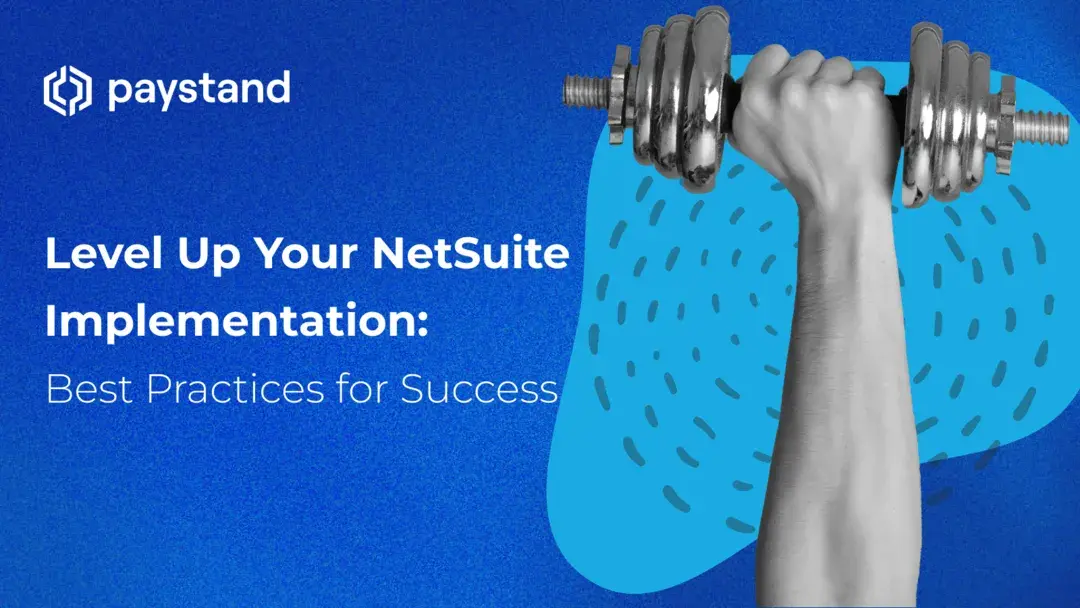Level Up Your NetSuite Implementation: Best Practices for Success

In today's digital era, choosing a payment solution that seamlessly integrates with NetSuite is crucial. Optimizing financial operations, streamlining processes, and integrating with essential financial workflows like NetSuite invoicing and automated cash application are top priorities in NetSuite best practices. Selecting the right payment solution plays a vital role in achieving these goals. This ensures smooth data flow, eliminates manual reconciliation efforts, and minimizes the risk of errors.
Businesses transitioning from legacy systems, such as a Quickbooks to NetSuite migration, must ensure compatibility. A well-integrated payment solution facilitates a smoother transition and prevents disruptions to financial operations. Additionally, addressing NetSuite accounting gaps is vital for accurate financial reporting and regulatory compliance.
Curious to learn more about NetSuite best practices for your business? Keep reading as we delve into essential features, common challenges, and the benefits of making informed decisions.
NetSuite Best Practices for Successful Implementation
Implementing NetSuite effectively involves adhering to several best practices to ensure a smooth deployment and maximum benefits for your organization. Here are key recommendations:
- Thorough Planning. Before implementing, analyze your organization's needs, processes, and objectives. Clearly outline your business goals and requirements to guide the implementation process efficiently.
- Engage Stakeholders. Throughout the implementation process, involve key stakeholders from various departments. Their input and support are crucial for successful adoption and alignment with business objectives.
- Customization vs. Configuration. Understand the distinction between customization and configuration in NetSuite. Prioritize configuration whenever possible to leverage built-in features and minimize future maintenance efforts.
- Data Cleansing and Migration. Dedicate time to clean and organize your data before migrating to NetSuite. Ensure data integrity by identifying duplicate records, resolving inconsistencies, and accurately mapping data fields to NetSuite's model.
- Training and Change Management. Provide comprehensive training to users at all levels to ensure they can utilize NetSuite effectively. **NetSuite training and even NetSuite certification can prove highly valuable for key users.** Implement change management strategies to address resistance and promote user adoption.
- Phased Rollout. Instead of going live with the entire system at once, consider a phased approach to implementation. This allows smoother transitions, more straightforward issue resolution, and better resource management.
- Testing and Quality Assurance. Conduct thorough testing at each implementation stage to promptly identify and address any issues. Establish clear testing criteria and involve end-users in user acceptance testing to validate functionality and usability.
- Performance Optimization. Review system configurations, monitor resource usage, and implement recommended NetSuite best practices to optimize performance. Refine configurations regularly to ensure optimal performance as your business evolves.
- Documentation and Knowledge Sharing. Document all configurations, customizations, and processes for future reference, training, and troubleshooting. Encourage knowledge sharing among NetSuite administrators and users to foster continuous improvement.
- Post-Implementation Support. Plan for ongoing support and maintenance post-implementation. Establish protocols for addressing user inquiries, resolving issues, and implementing updates to ensure NetSuite continues to meet your organization's evolving needs.
What to Look for When Choosing a Payment Solution for NetSuite
Selecting a payment solution for NetSuite requires careful consideration of various key features to ensure seamless integration and efficient payment processing. Here's an elaboration and expansion on the input text:
- Integration with NetSuite. The ideal payment solution should work flawlessly within your NetSuite ERP software, ensuring two-way data flow for accurate reporting and streamlined operations.
- Security: Evaluate encryption standards and data protection measures to safeguard sensitive information. Look for tokenization to secure credit card data.
- Payment Processing Fees. Compare transaction fees, monthly charges, and compliance fees to ensure transparent and predictable pricing.
- Supported Payment Methods. Offer diverse payment options to accommodate customer preferences. Ensure support for recurring payments and subscription billing. Consider solutions that specialize in NetSuite integrated payments.
- Reporting and Analytics. Assess detailed transaction reports and real-time dashboards for insights into payment performance.
- Fraud Detection and Prevention. Consider measures like address verification and fraud scoring to minimize fraudulent transactions.
- Customer Support. Evaluate the provider's responsiveness and track record in efficiently resolving customer queries.
- Scalability and Growth. Ensure the solution can handle increasing transaction volumes and support multiple currencies if necessary as your business expands.
- Customization Options. Look for flexibility in customizing checkout processes and payment forms to align with your brand and business needs.
- NetSuite Marketplace. Explore the NetSuite marketplace to find solutions built specifically to integrate with the system.
What Are the Most Common Challenges in NetSuite Payments?
NetSuite offers robust financial management tools, but handling payments within the system can be complex. Transaction discrepancies are a common headache, hindering accurate financial reporting and requiring meticulous correction. Many NetSuite payment processes involve manual data entry, which is time-consuming, prone to errors, and can create bottlenecks as your business scales.
Integrating new payment solutions into your existing NetSuite setup can be difficult. Compatibility issues or unexpected technical problems can lead to delays and unforeseen expenses. Careful planning and cross-team coordination are crucial for successful implementation.
To overcome these challenges and get the most out of NetSuite, it's important to be aware of transaction discrepancies, inefficiencies caused by manual work, and potential hurdles when integrating new payment solutions. Proactive management, supported by the right tools and NetSuite skills, can help ensure effective troubleshooting.
Streamline Your Payment Processes with Paystand for NetSuite
Looking to optimize your payment processes within NetSuite? Paystand offers a seamless integration, ensuring smooth data flow and accuracy across systems. With robust security measures, including encryption standards and tokenization, Paystand safeguards sensitive information, providing you and your customers peace of mind.
It also supports many payment methods, including recurring payments and subscription billing. Paystand adapts to your customers' preferences while providing detailed transaction reports and real-time dashboards for insights into payment performance.
Choose Paystand for NetSuite and experience a seamless payment experience that optimizes financial operations and supports your business' growth and goals.







